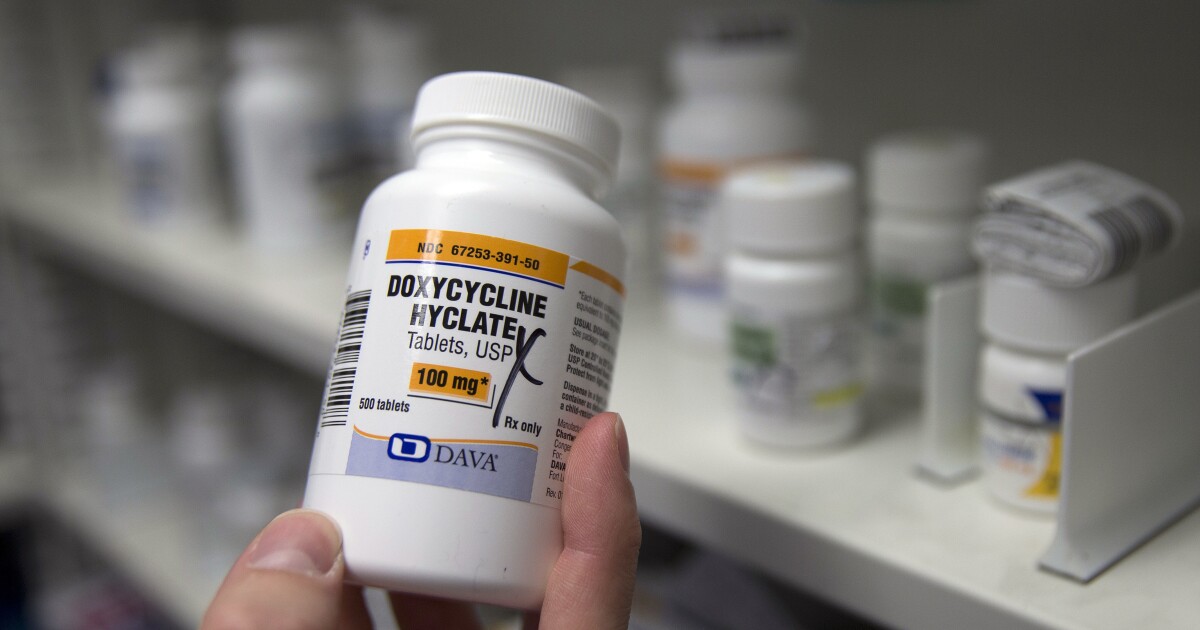

The Centers for Disease Control and Prevention is recommending the use of the antibiotic doxycycline as a preventive measure against bacterial sexually transmitted infections, or STIs.
The CDC on Monday published a notice for comment from physicians and public health officials on proposed guidance on the use of doxycycline as prophylaxis to prevent gonorrhea, chlamydia, and syphilis, which experts said could be a turning point in the fight against the STI epidemic.
EPA STATE GRANTS COULD FUND GREEN POLICIES DEMOCRATS COULDN’T GET AT FEDERAL LEVEL
The dose of doxycycline for STI prophylaxis would be 200 milligrams taken once within 72 hours of any form of sexual activity for men who have sex with men either with a history of at least one bacterial STI in the last year or deemed to be at “at ongoing risk for acquisition of bacterial STIs.”
Developed by Pfizer in the early 1960s, doxycycline has a multitude of uses, including malaria and Lyme disease prophylaxis as well as acne treatment. Doxycycline is already the first-line treatment for chlamydia and is an alternative treatment for syphilis in those with a severe penicillin allergy.
“Novel approaches are needed to address the STI epidemic, especially for populations disproportionately affected,” the CDC said in its proposed guidance.
The clinical studies of doxycycline post-exposure prohylaxis, or Doxy-PEP, that the CDC cited examined biological men who have sex with men who were negative for HIV. The results showed high efficacy with minimal gastrointestinal side effects that stopped with discontinued use.
There are higher rates of STIs among men who have sex with men, with repeated bacterial infections being a possible indicator of undiagnosed HIV infection. The CDC already recommends that nonmonogamous men who have sex with men seek testing for STIs at three- to six-month intervals, depending on their sexual behavior.
One randomized trial of females taking Doxy-PEP also failed to show a benefit, in part due to participants not taking the antibiotic as required. Officials acknowledged, however, that more data are necessary before deciding on broader recommendations.
Another reason for limiting this recommendation to men who have sex with men is the risk of widespread use contributing to antibiotic resistance or mutations in bacteria that make prevention and treatment more difficult over time. Antibiotic resistance is one greatest global public health threats, according to the World Health Organization.
Although studies for doxycycline prophylaxis and acne treatment have demonstrated little impact on antibiotic resistance, CDC advisers noted that there is no long-term data available for prolonged doxycycline treatment.
“Current data suggest overall benefit of the use of doxycycline PEP, but potential risks related to the development of resistance and impacts on the microbiome will need to be closely monitored after implementation of these guidelines,” the CDC said.
CLICK HERE TO READ MORE FROM THE WASHINGTON EXAMINER
The proposed guidance comment period expires on Nov. 16, when the CDC will issue its final recommendations.
The Washington Examiner contacted the CDC and the Department of Health and Human Services with requests for comment on the effects of doxycycline prophylaxis on gay and transgender people.



